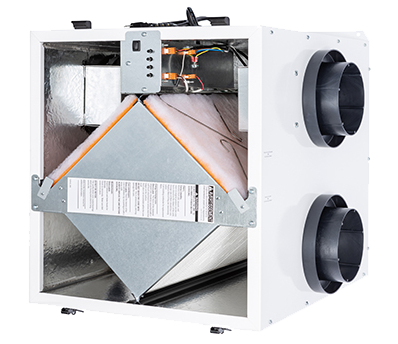Energy Recovery Ventilatation


Fresh air ventilation systems help improve and maintain healthy indoor air.
ASHRAE and the CDC have stated that introducing outside fresh air ventilation into our homes and buildings can have a very positive impact on improving the indoor air quality and living environments.
“Dilution is a solution” is the saying many will use when explaining the benefits of utilizing outside fresh air ventilation as a means of introducing 100% outside air into HVAC and home comfort systems.
Energy Recovery Ventilation Systems (ERVs) offer the ability to pre-condition the outdoor air by transferring both heat and humidity to the air as it is drawn into the home. In the winter, that means that the cold outside air is pre-heated by the outgoing warm interior air. And in the summer, the warm outside air is pre-cooled by the outgoing air-conditioned interior air.
In addition, an ERV system can be installed to create positive pressure inside the home envelope, keeping radon, wildfire smoke, and other airborne pollutants from infiltrating the home.
How Energy Recovery Ventilation Works
An energy recovery ventilator, or ERV, is a system that employs energy recovery technology as it brings fresh outdoor air into the home. This process uses balanced airflows and recovers otherwise-expended total energy comprised of heat (sensible energy) and humidity (latent energy). In summer, warm outside air is pre-cooled via the total energy from the outgoing cool interior air. In winter, cold outside air is pre-heated and humidified via the total energy from the outgoing warm interior air. Subsequently, less energy is needed for conditioning and ventilation, reducing the load on HVAC equipment and saving energy.
How Radon Reduction Works
In a slightly different installation, the exhaust air is recirculated back into the home along with the fresh outdoor air. This creates positive pressure inside the home envelope, which keeps radon, wildfire smoke, smog, and other outdoor pollutants from seeping into the home. All air is filtered at both the ERV system, as well as at the furnace, providing further reduction in airborne particles.
